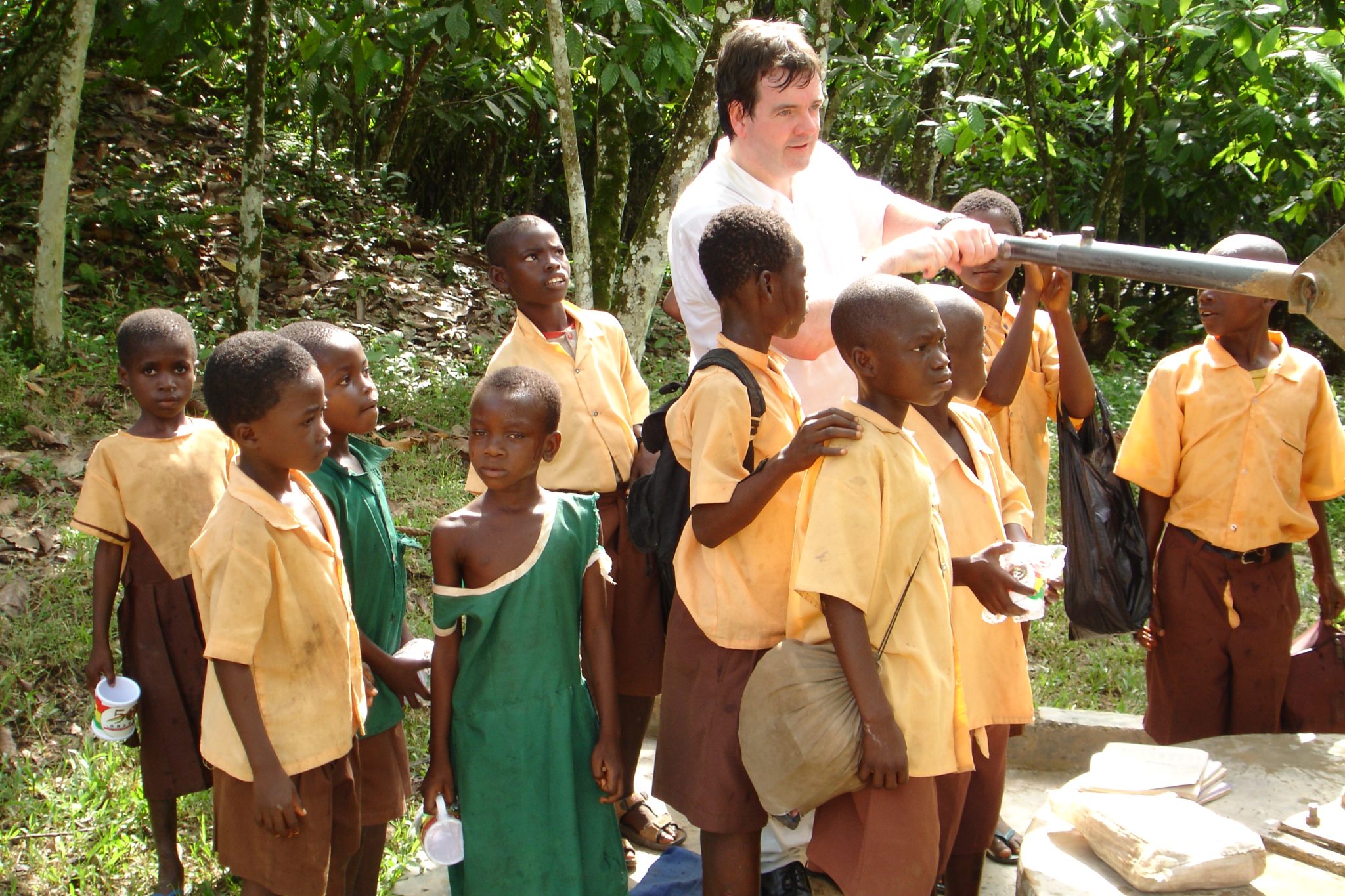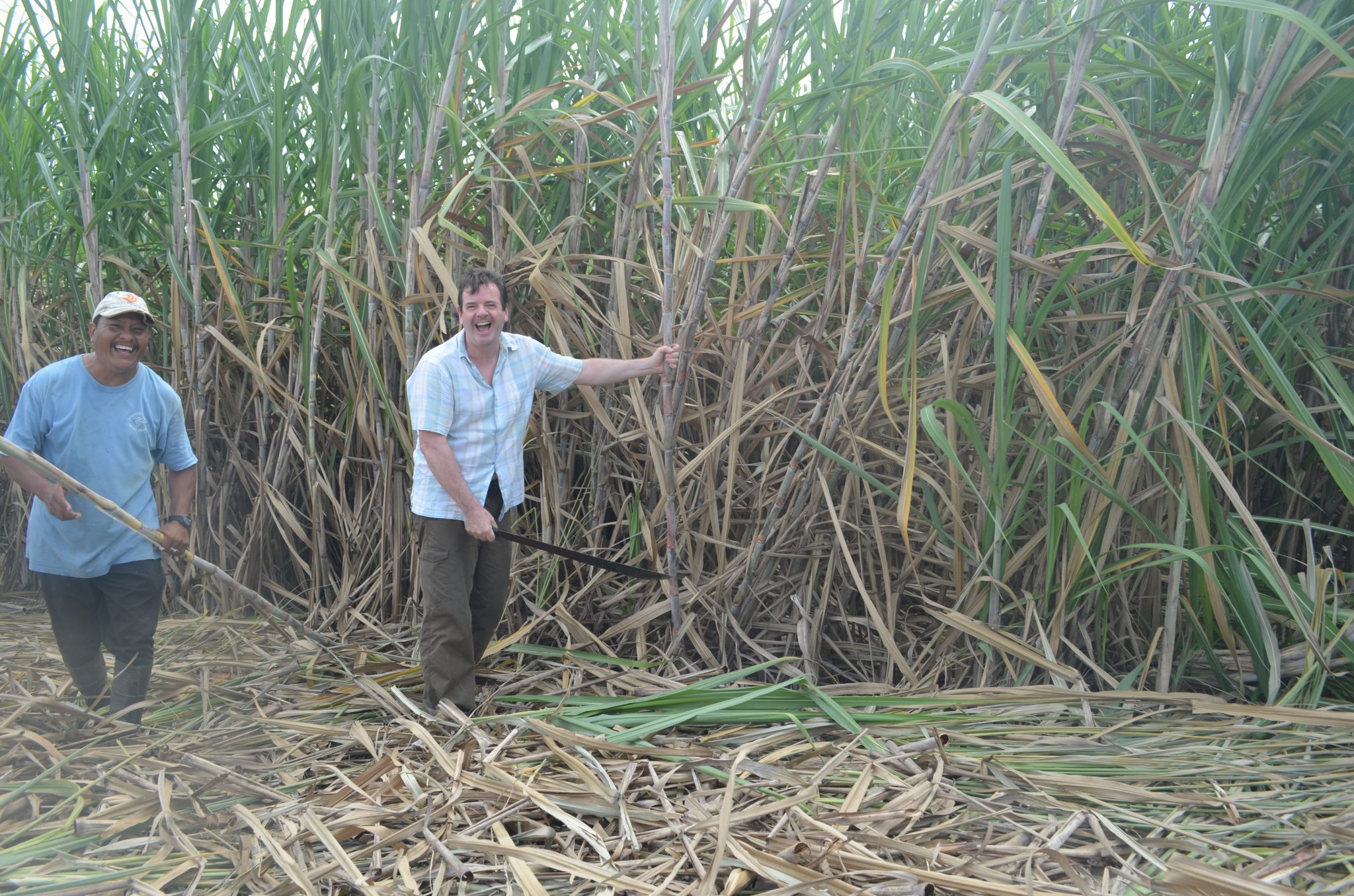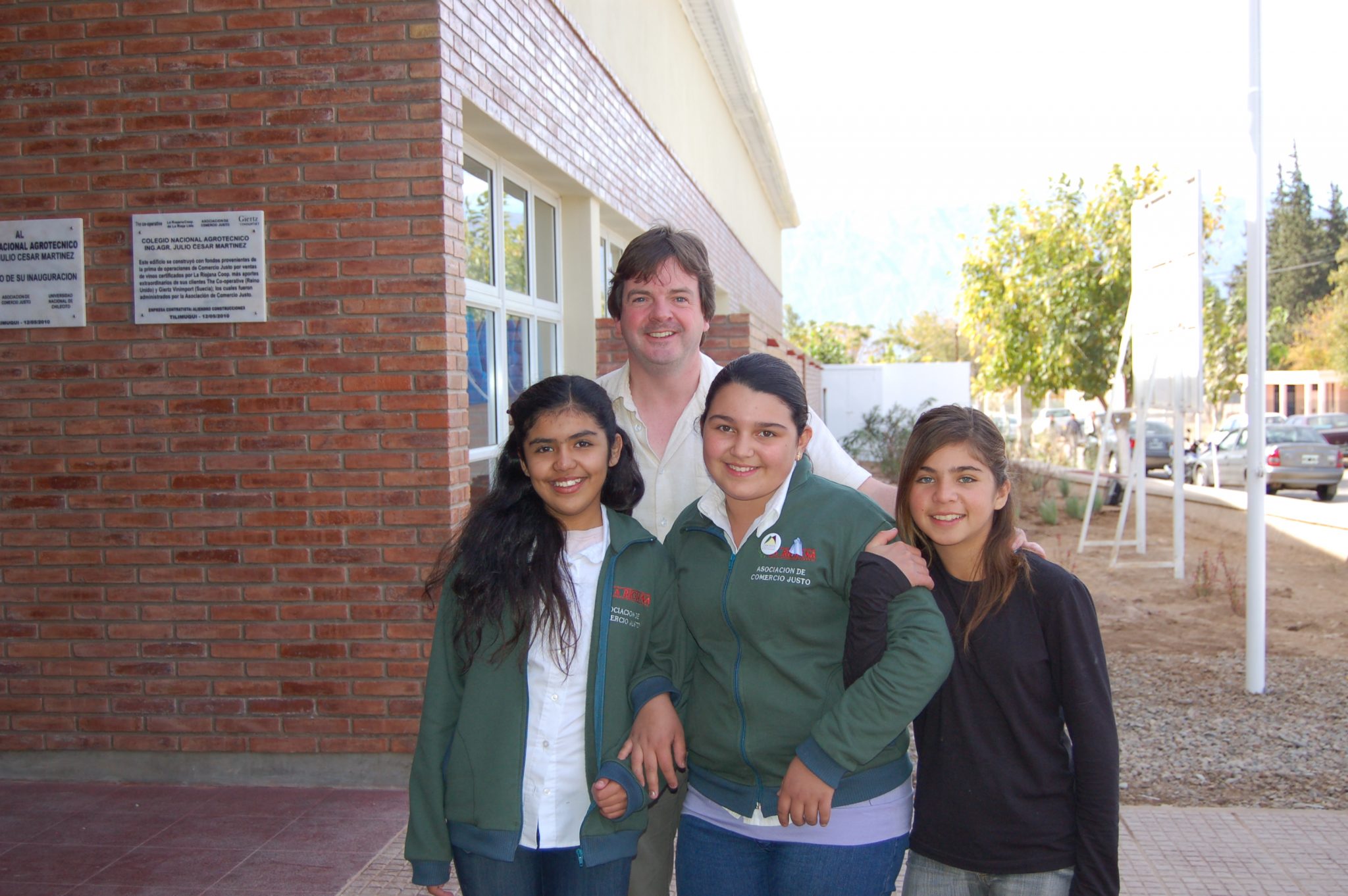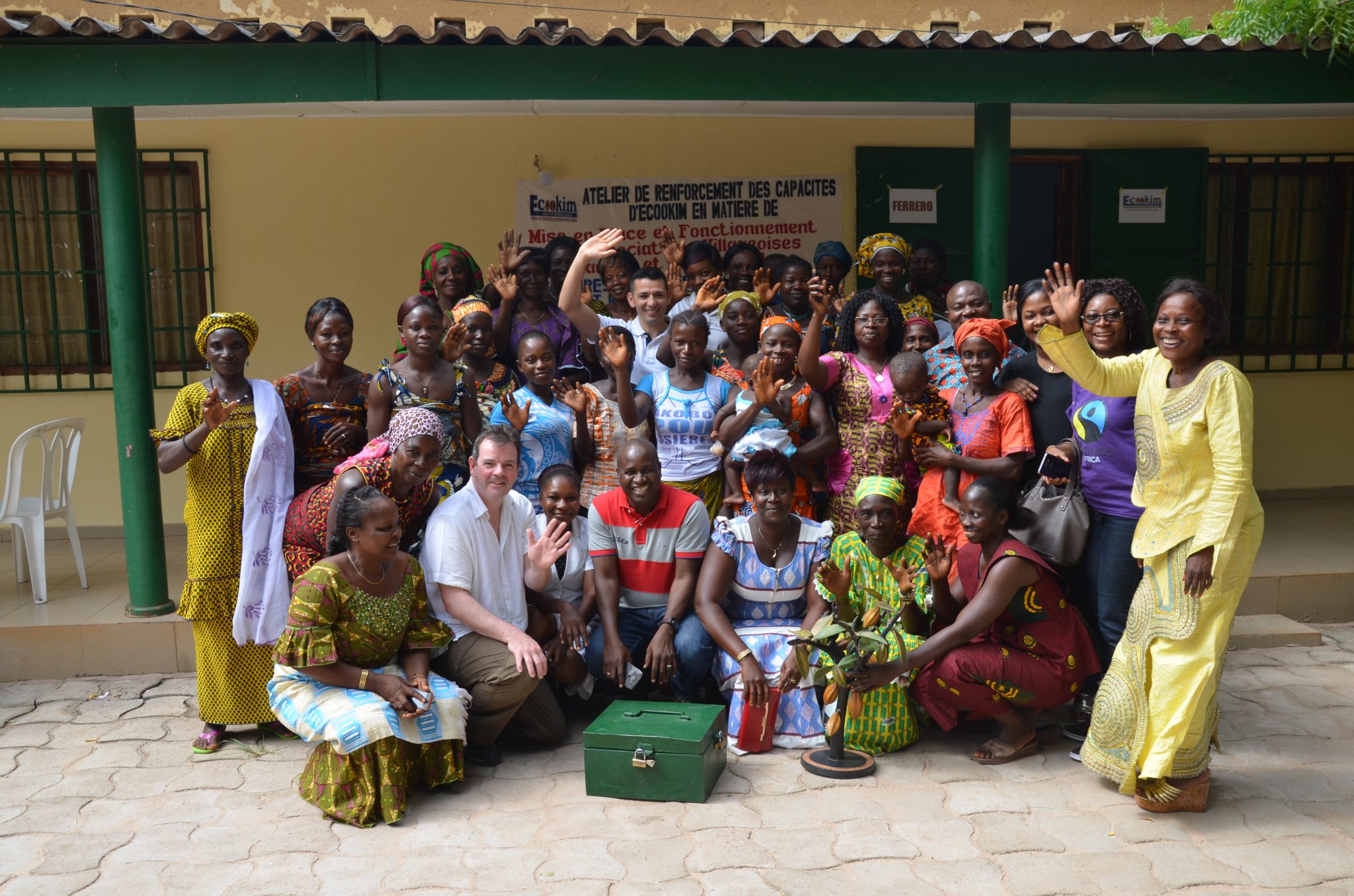Throughout Co-operatives Fortnight 2018, we’re sharing some of the brilliant stories from UK and international co-ops which show the #coopdifference in action: how, where and why co-operatives can make a difference to you and your communities.
Q&A with Brad Hill
Brad Hill has worked at the Co-op Group for 40 years and in Fairtrade for 20. Ahead of his retirement as Fairtrade strategy development manager this summer, he looks back over a career that has witnessed first-hand the difference Fairtrade makes.
How did you get into Fairtrade?
I joined the Co-op Group (then CWS) from school at 16, and continued studying part time. In 1986 I became the Group’s first internally appointed ‘graduate trainee’ and over the next few years gained experience in marketing from various angles. In the 90s the Group created a new corporate marketing team in food which was charged with challenging convention and leading on ethical matters.
This really appealed, and meant I was involved in the first real re-engagement of doing business in a co-op way. This included everything from animal welfare and Braille on packaging, to honest labelling and developing our first national charity campaign with NSPCC. In 1998 I began working on Fairtrade and trying to find ways of making it commercially viable. Of all the work I was involved in, I naturally gravitated to the people agendas – charity and Fairtrade.
How did your interest in Fairtrade develop?
My first few years in Fairtrade were spent behind a desk in Manchester, trying to engage the business in the concept and convince decision makers to give it a chance. It was a very co-operative concept – and if any business was going to make Fairtrade mainstream, then it was the Co-op. In 2003 I went on my first overseas visit to see Fairtrade in action in Ghana. That was my real ‘Fairtrade moment’, seeing not just real poverty in agricultural communities, but genuine life-changing improvements as a result of some of our early successes.
Part of the visit was to Kuapa Kokoo (the cocoa co-op which owns 44% of Divine Chocolate). Joining its AGM and talking to members, it felt like looking in a mirror from a co-op perspective. But despite Fairtrade, these people – the suppliers of the products we were selling – had so little. I got talking to a man at a village drawing water from a Fairtrade funded pump who really connected the benefits of that pump to the support that I had been fighting for. It was a strange feeling: on the one hand the importance of Co-op’s Fairtrade strategy hit home and became a reality. On the other hand, I couldn’t help but feel that if a person was celebrating something as basic as clean water, then the need for Fairtrade and our accelerated support was critical. That day Fairtrade became less of a job and more of a calling. I was the person given the opportunity to lead on changing lives through Fairtrade on behalf of impoverished people. It was a big responsibility and one that, morally, I had to throw my all into.

Why do the co-operative model and Fairtrade have such synergy?
When Fairtrade launched in the UK in 1994, the Co-op Group recognised the synergies derived from the values that underpin both movements. Essentially both co-operatives and Fairtrade are democratic and people-based movements. Fairtrade is designed to support small producer organisations and requires equity and equality as well as promoting education and specific elements such as gender balance. Fairtrade Premium committees, for example, which decide how to invest the Fairtrade Premium, are created in a way which is representative of the wider business and communities that the individual members represent.

Fairtrade impacts are so obvious across both the hired labour model (where workers in larger scale organisations are supported) and in the small producer model (where developing co-op structures have allowed individuals to access markets and improve their lives). I have witnessed positive changes repeatedly in both cases.
Perhaps the best example is that of Fintea tea co-op in Kenya – a group of 15,000 farmers who, as individuals competing in the tea-growing regions, had little chance of ever accessing international markets. As part of our own work, and supported by the Co-operative College, we helped create Fintea co-operative and offered training in Fairtrade requirements and co-operative ways of working. One farmer, Mercy Maritim, dreamed one day of moving out of her small mud house, and hoped that better prices may allow her to buy a cow and sell milk locally. Within 18 months, Mercy had not one but two cows, and was living in a much larger brick house with electricity and running water – an incredible life transformation in a short space of time. And really thanks not just to Fairtrade – but to being a co-operative member.
Do you think the relationship between co-ops and Fairtrade will change?
Fairtrade itself has been focusing much more on small producers and their co-operatives and, given the structure of the supply base,
co-operatives will always remain a cornerstone of the Fairtrade movement. Fairtrade as a brand continues to have a responsibility to give those co-ops a voice, and partner licensees also need to take that responsibility seriously. In the case of the Co-op Group, I can see both Fairtrade and the co-op model becoming even more significant to the business as we continue to look for ways to demonstrate our own co-op difference in an increasingly
competitive market.

How has the Co-op Group has made a difference through Fairtrade?
Lots of small steps have been the key to making Fairtrade a real success story – as well as unrelenting championing of Fairtrade.
In 2002, when we switched all of our own-brand chocolate to Fairtrade, we campaigned for other retailers to invest in Fairtrade too, and challenged the big brands to wake up to the exploitation that was rife in the cocoa industry. Over the following years, Fairtrade became widely available and we have seen all three of the UK’s biggest chocolate brands engage with Fairtrade. There is no doubt that the Co-op’s pioneering action and leadership has been a catalyst and derived significant indirect benefits across the industry.
Related: Making a difference – credit unions
In 2012 we switched all bananas to Fairtrade – this was a difficult one to secure commercially. The detail behind the plan went much further than we had gone on previous category conversions but we were able to create a sourcing model which focused on at least 50% of the fruit coming in from smallholders
– mainly co-ops. And on top of that I worked on some co-op collaborations – most notably with COOBANA co-op in Panama and Banelino Co-op in Dominican Republic – where the Group invested in additional ‘beyond Fairtrade’ projects, helping to strengthen fellow co-ops in terms of capacity building, training and education
In the last couple of years, with focus on delivering more impacts in key areas through our Fairtrade ingredients policy, we have continued to
innovate and find ways to keep momentum. We work with other co-ops to demonstrate that the Co-op Group does Fairtrade differently – with a depth of commitment like no other retailer. In terms of leadership, it’s clear that the Co-op dominates the market; we have over 80% of UK convenience Fairtrade sales and are the world’s largest seller of Fairtrade wines.
Why do you believe now is the right time to move on? What are your plans?
This job will never be finished but I believe it has reached a point where there needs to be a step change directionally. For 20 years I have been supporting the values of Fairtrade and the people behind the Fairtrade Mark, as well as building a co-op difference to the approach. Fairtrade has reached levels of sales and impact that nobody could have dreamed – but as a brand there is growing evidence that the ‘ethical market’ is fracturing.
Fairtrade has reached mainstream in so many ways and has successfully challenged businesses to look at themselves. We will not see the same significant levels of growth in the Fairtrade food sector as we have in the past – so the Group needs to look at how to build on its success to drive a more co-op focused agenda for producers. Fairtrade policies are robust and embedded now within the business. And we have a brilliant young Food Policy Team to take us forward with Fairtrade and a wider co-op fair trade approach. So it feels as if I can leave the legacy in very safe hands and give someone else the opportunity to take stewardship.
So many people tell me it must be the best job in the world. I honestly think it is – which is why I have been here for so long. I am so fortunate, but at the same time want someone else to have at least some of the experiences and rewards that I have had over two decades.
I still feel a responsibility to the producers and I will be continuing my support for Fairtrade once I have moved on. After a short break I will see what options may exist where I believe my experience can add value; I am especially keen on getting back into classrooms and sharing my stories with children to hopefully help inspire the next generation of Fairtrade and ethical shoppers and campaigners.
